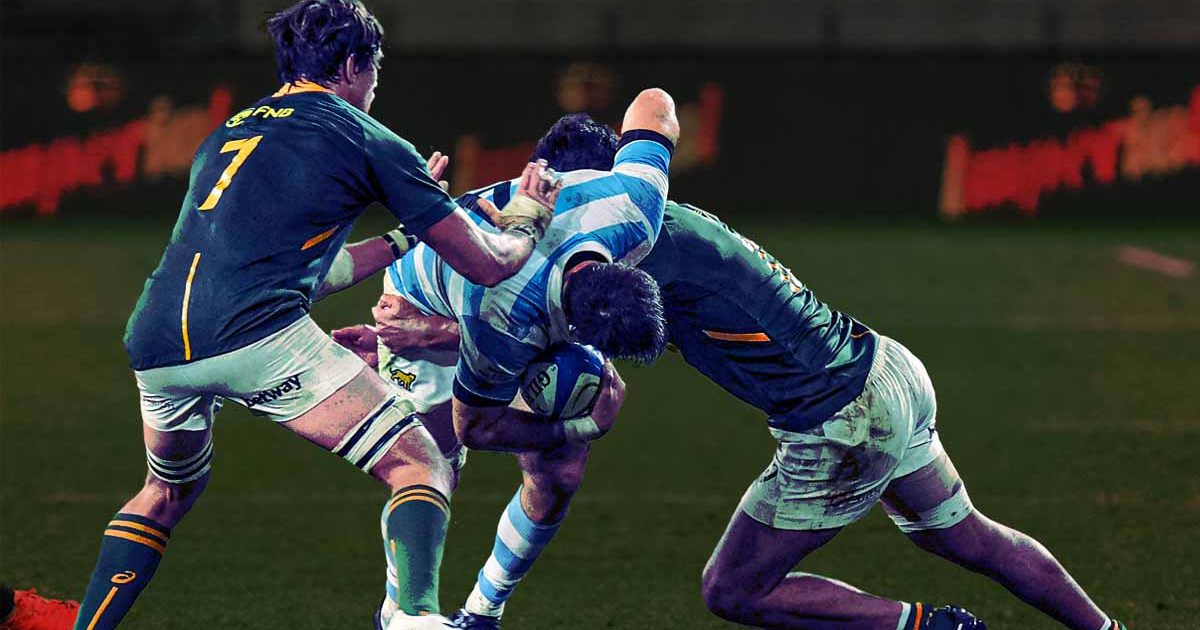Neil de Kock: Shades of Saracens-style aggression to Springboks defence

The Springboks have only conceded 15 tries in their last 18 Tests, which equates to 0.8 tries per match. The Boks’ defensive success is a by-product of an undimmed focus from a coaching perspective on a system that is working incredibly well since Jacques Nienaber and Rassie Erasmus took the helm.
After the Springboks copped a 57-0 hiding from the All Blacks in 2017, the new coaching staff dialled it back. Nienaber and Erasmus worked on what they could control and returned to South Africa’s traditional strengths. The Springboks have always been strong in the physical part of the game and they focused on dominating the set-pieces and collisions. It became about defending well and keeping teams out.
Nienaber, who started as a physiotherapist, has morphed into a defensive mastermind. Line-speed as well as physicality at the breakdown and contact at the collisions are key ingredients in Nienbaber’s defensive recipe. By all accounts, if you are winning the collisions and stopping momentum – which the Boks have been doing – then getting off the line is so much easier.
I suppose there are similarities between Saracens and the Springboks on a defensive front but I wouldn’t say one mirrors the other.
The ‘Wolfpack’ defence started out as a throwaway catchphrase and ended up as a crucial part of our identity. At the time, we had some pretty creative coaches in Alex Sanderson and Paul Gustard who drove the process. Every time we went into a team session we would always affirm our commitment by saying, “We love defending!” It was part and parcel of what we were all about particularly in those first couple of years because, like the Springboks, we had to dial it back somewhat. Saracens went through an up-and-down period so we decided to play to our strengths. At the outset we said, “We can’t be a team who is going to pass the ball, break the line and score tonnes of tries. Instead, let’s focus on what we can control – namely our defensive system.”
Our Wolfpack defence, which earned mythical status, was underpinned by aggressive line-speed, sound decision-making and tactical adaptability. In terms of when to drift and when to blitz, it became a feel thing for us as players on the field. It was always a case of getting off the line but similarly, it came back to the way I see the Springboks dominate on defence – through the collisions.
The Boks bring a brutal physicality to the field but it’s always in a disciplined and well-organised system, which makes it so frustrating for teams to break down. However, if there is one team in world rugby who can unpick the Bok defence, it’s the Wallabies – who employ a multi-phase approach.
For Australia, it’s about the speed of their ball. They are going to look around channel one and two to unlock the Boks’ aggressive rush defence and have been pretty cute with over-throws at the back of the lineout and have introduced some really interesting first-phase plays around scrum-time. I have also been impressed with 22-year-old scrumhalf Tate McDermott, who snipes around the fringes, and I expect him to be a catalyst in terms of trying to expose South Africa closer to and around the ruck. It’s about trying to get a defender to bite and then putting someone into a half-gap.
When the Wallabies tackle the Springboks on the Gold Coast, it will be about trying to speed up the game and not getting into a position where there are too many stoppages. The Boks were criticised for slowing down play particularly in the first two tests of the British & Irish Lions series but, for me, it didn’t look like the visitors wanted to play too quickly either. Neither team seemed intent to speed up the game in a series which will be remembered for being a mighty arm-wrestle. As such, it will be pleasing to see Australia employ a fast-paced approach and put the officials under pressure to play.
The Springbok defence isn’t perfect but, by and large, they defend pretty well in all facets of play and what they do is scramble highly effectively. So even if opposition break the line, the Boks scramble well enough to live to fight another day, which is another strength of their makeup at the moment.
Lukhanyo Am, who made a miraculous try-saving steal against Argentina last Saturday, has been unbelievable for this Springbok group and I think his value is often understated from an external front. He is the type of player who slips under the radar but I would suggest that he would probably be one of the first names on most of his colleagues’ team sheets. In terms of his effect and impact, what you would find is that internally the squad would agree that he is invaluable. Am is pivotal in his role as defensive organiser in the Springbok backline and is equally effective on attack owing to his physicality. He doesn’t stand back in the No 13 jersey. You often find midfielders are only good in one of the two aspects but Am, like Jaque Fourie was, is well-balanced on both attack and defence.
Following an 11-year career with Saracens, which saw him earn 264 caps, Neil de Kock now works in the rugby division at the Stellenbosch Academy of Sport in South Africa. De Kock, who featured in 10 Test matches for the Springboks, provides RugbyPass with expert opinion and insight focusing on the southern hemisphere sides.





































































